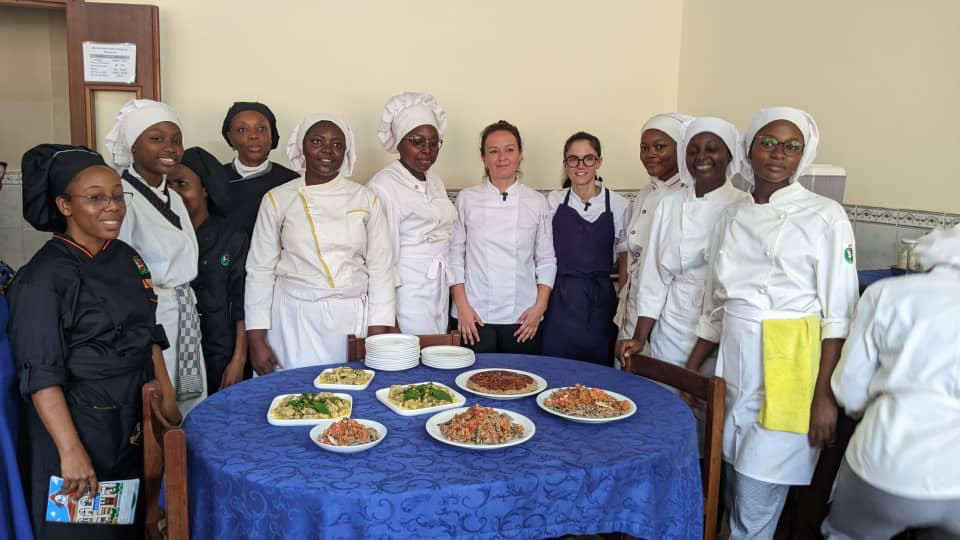Vocational Training Center in Hospitality and Catering





Ouverture des inscriptions pour l' Année Académique: 2025/2026
Tips for helping your child at home and accompanying them in his homework and lessons.
Create in the house a climate conducive to studies (space, tranquility, time).
Determine with the child a suitable place of study.
Plan the study schedule with the child.
Provide the child with resources such as a dictionary, magazines, newspapers, etc.
Let the child work for a given period while checking the progress of the work at regular intervals.
Look at the child's notebooks and work and provide positive feedback.
Intervene directly, according to needs and circumstances.
Find out about the child's school experience and ask him to verbalize his work plan.
Offer help to listen to a reading, ask for a lesson, give leads to start an activity.
Guide the child in the realization of his personal project.
Encourage and value the child in what he or she does, give him strength and challenges.
Live enriching activities with the child: game of chess, discussion on a current topic, preparation of a recipe, realization of crosswords, reading of the daily newspaper, etc.
Practical advice for students
To be successful, you have to be well prepared! What are good places to study? :
You will learn best in a quiet place like your bedroom or the school library.
Noise, such as television, people talking, loud music, impairs concentration and makes studying more difficult.
It is best to always study in the same place.
You must have on your work table all the necessary materials (pencil, notebook, ruler, manual).
You must remove from your work table all objects that could distract you (comics, material from other subjects, games, etc.).
The room where you study should not be too hot but it should be well lit.
What are the best times to study? :
You should start preparing for an exam at least two weeks before.
The day before the exam, you should only have to do one last review; not start studying.
It is better to study for several short periods (30 minutes to 1 hour) rather than for long periods.
It is essential to plan your study periods in advance.
It is much more profitable to study when you are rested.
The best times to study are mid-evening, late afternoon, and morning. Periods immediately following meals are not the best.
It is important that you reward yourself after a period of study with an enjoyable activity (outing, snack, TV show, music, etc.).
ALWAYS ASK YOURSELF WHAT YOU MUST DO TO ENSURE YOUR OWN SUCCESS AND NOT WHAT OTHERS MUST DO FOR YOU!
Help with homework
Support for students in the performance of their homework is an effective way to fight against academic delay and dropping out. It helps students in difficulty regain confidence in their academic abilities and regain their self-esteem.
Parents can help children with their homework, or at least be present during homework time.
10 tips to do your homework better
Pick a specific time to do homework.
Always choose the same place to do your homework.
Choose a well-lit location.
Choose a table big enough to spread out your books and notebooks.
Work on a clean surface.
For the parent, supervising and helping the child with homework.
Eliminate sources of distraction.
Seek calm.
Stay positive.
Have fun !
My child wants to pick up:
10 good reasons to start and finish your training!
The average salary of a graduate is 35% higher than that of someone who has not completed their studies.
The unemployment rate is twice as high among dropouts.
The most interesting jobs – and the best paying! – require good training and qualifications. Today, the majority of jobs require at least a diploma or vocational training.
Lack of training and unemployment more often lead to health problems and financial problems.
Those with a degree live an average of seven years longer than those without.
Those who do not complete high school are twice as likely to suffer from depression in the next few years.
Whatever you think, dropping out of school won't improve your situation.
To access the job of your dreams, there is a good chance that you must first train yourself,
By finishing high school right away, you save time since 80% of dropouts end up going back to school.
With a degree, your self-confidence will skyrocket!
As a parent, what can I do?
First, communicate
Take a break and talk with your child about the importance of completing high school. You could change his future…Having a discussion with him about the importance you place on his studies is essential. Take the opportunity to remind him that you are there to help and support him in case of difficulties.
Take a break and talk with your child about the importance of completing high school. You could change his future…Having a discussion with him about the importance you place on his studies is essential. Take the opportunity to remind him that you are there to help and support him in case of difficulties.
Help him get organized
By being well prepared, we face difficulties more easily. Help your child complete the school year successfully:
Make sure he has all the necessary school supplies.
To follow the rhythm of his weeks, make a copy of his schedule.
From the first days, agree with him study periods at home to better manage this time essential to academic success.
Find out regularly about work to be submitted, upcoming exams, oral presentations to prepare.
Periods are often more conducive to dropping out among young people: at the start of the school year, after the holiday break and during exams in June.
Identify the source of demotivation:
A strained relationship with a teacher, heartbreak, bullying, etc. What seems trivial to you may be out of all proportion to your child.
Experiencing repeated failures is enough to shake a student's self-confidence and convince him that school is not for him.
The lack of long-term vision, which characterizes many teenagers, makes it difficult for them to project themselves into the future. They have few ideas of what they want to do later; no wonder getting a degree is becoming less urgent.
Increase your motivation
OPEN DAY
Wednesday, April 6, 2022
Open Day
Date: April 6, 2022
Hours: 10:00 - 17:00
Theme: ethics and professionalism in the hotel environment.
Place: CFPF SORAWELL located in Essos near the ENEO agency
Telephone: (237) 673 754 798 / 694 389 562
WELCOMING HOME
January 11 - March 3, 2022
Price: 50,000 FCFA
Date: Tuesdays and Thursdays
Hours: 3 p.m. - 6 p.m.
Focus: Pastry
THIRD PERIOD OF CFPF TRAINING
March 14 - April 25, 2022
Rotation: Monday March 14
Easter holidays: Friday 08 April (evening) to Monday 18 April 2022.
Theoretical evaluation: Tuesday 19 to Friday 22 April 2022.
Practical end-of-module assessment: Thursday 21 to Monday April 25, 2022.
Deadline for submitting theoretical notes and practices : Monday, April 25, 2022.
1.
Je m’appelle Edwige Aimée, apprenante au CFPF Sorawell de 2002 à 2005. J’ai beaucoup apprécié mes années de formation, particulièrement l’ambiance de famille et la façon dont nous étions formées. Je me souviens que je recevais toujours des encouragements lorsque j’étais découragée, les monitrices étaient vraiment gentilles.
J’ai reçu à Sorawell la formation professionnelle mais aussi humaine et spirituelle. Cela m’a été d’un très grand apport dans ma vie professionnelle. J’ai connu Dieu à Sorawell et j’ai aussi appris à avoir confiance en moi. Je garde de très bons souvenirs de Sorawell.
